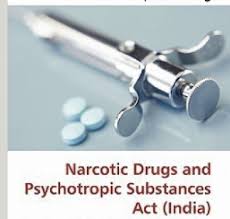Drug Trafficking and Enforcement in India
Judicial CrackdownPosted by AI on 2025-07-15 17:19:28 | Last Updated by AI on 2025-08-13 08:17:53
Share: Facebook | Twitter | Whatsapp | Linkedin Visits: 7

Narcotics drugs and psychotropic substances pose a significant danger to the health and well-being of citizens in India. Consequently, the NDPS Act, 1985 enlists a comprehensive set of provisions and penalties to combat drug trafficking.
The NDPS Act imposes a maximum of 20 years in prison for producing, supplying, or importing drugs, with a penalty of up to Rs. 1 lakh. The Act also sets a maximum sentence of 10 years in jail, along with a fine of up to Rs. 50,000 for possessing drugs.
Recently, the Narcotics Control Bureau (NCB) arrested a man in Kochi for allegedly possessing around 1.2 million psychotropic tablets, 200 grams of opium, and 100 grams of hashish oil. This incident underscores the prevalence of drug trafficking and the need for vigilant enforcement.
The man accused of trafficking was previously involved in a similar case back in 2014. This suggests a pattern of narcotics abuse and trafficking, highlighting the necessity for stricter policies and their proper implementation.
The latest arrest serves as a reminder of the ongoing battle against narcotics and the role of authorities in safeguarding the community. With increasing drug abuse, particularly among young people, it is vital to have a focused approach to prevention, intervention, and treatment, alongside stringent enforcement efforts.
The NDPS Act, with its increased penalties and prison terms, intends to act as a deterrent, but much remains dependent on its proper implementation and the effectiveness of law enforcement agencies. For a drug-free society to become a reality, collaborative efforts between the government, healthcare providers, and educational institutions are paramount.
Search
Categories
- Sports
- Business
- History
- Politics
- International
- Science & Technology
- Social Issues
- Disaster Management
- Current Affairs
- Education
- Startup Business
- Startup News
- Awards
- Community Services
- Fundraising Events
- Volunteer Services
- Health Initiatives
- Innovations and Initiatives
- In News
- dummybanners
- Awards
- Partners
- Products
- Press Releases
- News
- Fast Check
- South
- సినిమా
- Gallery
- Sunday Chronicle
- Hyderabad Chronicle
- లైఫ్ స్టైల్
- National
- క్రైం
- ట్రెండింగ్
- జాబ్స్
- అంతర్జాతీయo
- బిజినెస్
- రాజకీయం
- బిజినెస్
- సంపాదకీయం
- నవ్య
- చిత్ర జ్యోతి
- క్రీడలు
- జాతీయం
- తెలంగాణ
- తాజా వార్తలు
- మన పార్టీ
- మన నాయకత్వం
- మన విజయాలు
- డౌన్లోడ్స్
- మీడియా వనరులు
- కార్యకర్తలు
- North East Skill Center News
- Government Schemes
- Entrepreneurship Support
- Employment Opportunities
- Skill Training Programs
- Departments
- Investments
- Initiatives
- Resources
- Telangana IT Parks
- Events & Jobs
- Press Releases
- News
- Airport News
- Newtons Laws of Motion
- Karbonn in Business
- Investments in Karbonn
- Company quarterly sales
- Markets
- Auto News
- Industry
- Money
- Advertisements
- Stock target
- Company Updates
- Stock Market
- Company Sales
- Staffing and HR
- Constituency Assembly
- General News
- Srikalahasti Temple
- Bojjala Sudhir Reddy
- Technology & Innovation
- Sports
- Business
- Products
- Industries
- Services & Trainings
- Tools & Resources
- Technology Integration
- Drug Seizures & Arrests
- Telangana Narcotics
- Law & Enforcement
- Rehabilitation
- Nationwide Drug Policing
- Nigeria Seizures
- Global Operations
- Drug Awareness
- Drug Enforcement Tech
- NCB Drug Seizures
- Judicial Crackdown
- India's Surveillance Tools
- Cross-Border Links
- Women Safety
- Cyber Crimes
- Drug Abuse
- Traffic & Road Safety
- Community Connect
- Public Safety Alerts
- Citizen Assistance
- Nellore City News
- Politics & Administration
- Events & Festivals
- Agriculture & Rural
- Business & Economy
- Health & Wellness
Recent News
- Man Linked To Goldy Brar Arrested In Badshahs Chandigarh Club Blast Case
- ED Raids 15 Locations Linked To Congress MLA In Karnataka Over Illegal Mining Case
- The Simple Act of Deleting Emails Could Help Save Britain's Drought Stricken Water Supply
- New Zealand hit by 4.9 magnitude earthquake, Geonet says
- China sending signals of thawing ties with India as it lifts export curbs on Urea
- Mamaearth Parent Honasa Consumer Shares Jump 13% On Strong Q1 Results
- JSW Cement IPO Allotment Today: Check Your Status Here
- 'He Called Me A Fat...': Liam Livingstone Reveals Tom Curran's Nasty Sledge